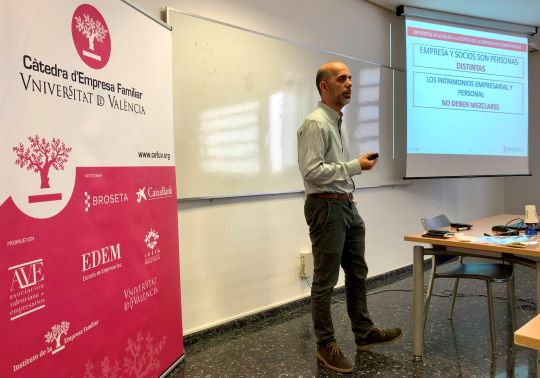
Last Friday, July 2nd, the eighth session of the Family Business Course: Key aspects for its competitiveness and durability (13th Edition) was taught by Alejandro Escribá. Professor, Director of the CEFUV and researcher of the IVIE.
Alejandro Escribá led a session focused on government and strategy in the Family Business, and began by asking the attendees what do you think are the main challenges currently facing most family businesses?, in general, have coincided in the generational continuity, increase in its size, professionalization, innovation, digitalization and internationalization of companies.
Once these aspects were listed and discussed, Alejandro explained the characteristics of Family Businesses that can affect decision-making:
- Parsimony, prevalence of a conservative policy of resources. These companies risk their personal and family wealth in strategic decisions. Loss aversion.
- Personalism, reflects that the last authority in the company is located in a person or in a family, which are not subject to internal controls, and sometimes not to external ones. Personal points of view are imposed on decisions.
- Particularism, use of particular criteria in decision-making as opposed to objective and/or rational criteria.
- Entrenchment, the desire to maintain their power and status, distrust of the ability of their successors, makes it difficult to attract external managers, discourages middle managers and potential successors and opens the way to possible power struggles.
- Difficulty in attracting and retaining external talent, socialization processes and the typical network of relationships of the Family Business limits the range of options in the selection of professionals.
The session ended with an explanation of the importance of the corporate and family governance structure, which refers to the principles and mechanisms aimed at improving the administration of companies. Practices that govern and control the relationships between stakeholders and an organization.
The second part of the day was in charge of Enrique Beaus, Partner – Director of Broseta Abogados, who directed one focused on the fiscal aspects of the Family Business.
Enrique began the session by explaining the relationship Family - Property - Company and the link of the taxation of the Family Business. The wealth tax is a state tax whose total income is ceded to the autonomous communities. The CCAA is transferred the income produced in its territory, corresponding to those taxable persons who have their habitual residence in that territory. The regulatory powers that the Autonomous Communities can assume are: the exempt minimum, tax rate and deductions and bonuses of the quota. In the case of the Valencian Community (2020), the exempt minimum is 500,000 euros, the tax rate 0.25% to 2.50% and 0% bonuses.
Afterwards, the professor explained when there is an obligation to declare the wealth tax:
- When the tax quota turns out to be paid
- Minimum exempt from the Valencian Community 2021: 500,000 euros
- When the value of the taxpayer's assets and rights (including exempt ones) exceeds 2,000,000 euros.
He went on to explain when the Family Business is exempt, according to Article 4, paragraph eights, two, Law 19/1991. It is exempt:
Full ownership, nude ownership and the right of lifetime usufruct over participations in entities, with or without quotation on organized markets, provided that the following conditions are met:
- That the entity, whether or not it is a company, does not have as its main activity the management of a movable or real estate asset.
- That the participation of the taxable person in the capital of the entity is at least 5% computed individually, or 20% jointly with his spouse, ascendants, descendants or collateral of the second degree, whether the relationship has its origin in consanguinity, in affinity or in adoption.
- That the taxable person effectively exercises management functions in the entity, receiving for it a remuneration that represents more than 50% of the total of the business, professional and personal work income. When the participation is maintained jointly, the requirement must be met by any of the family members.
The session continued to analyze the impact of inheritance and gift tax. The Inheritance and Donations Tax is also ceded at the regional level.








